HOW TO MAKE FOREIGN LANGUAGE TEXTBOOKS LINGUISTICALLY AND CULTURALLY GENDER BIAS-FREE AND INCLUSIVE: CHALLENGES AND RECOMMENDATIONS
Workshop
: 
WORKSHOP AND ROUND TABLE DISCUSSION
Friday, April 28 from 2:00 pm to 5:30 pm Central Time
The day before the CLI Chicago Language Symposium | Workshop 2-4 pm – Round Table Discussion 4-5:30 pm
Workshop Material
In many world languages classrooms, textbooks are the primary shapers of language curricula and windows into the cultures of the people speaking the languages taught. However, cultures continuously evolve, and with it human interactions, relationships, behavior patterns, and cultural norms. It is therefore incumbent on us, as the language teaching profession, to more fully understand how textbooks represent target language communities and how language learning activities help students engage critically with the representation of the communities and culture. The goal is to encourage students to find their voice in second-language classrooms as well as fully engaging them as individual human beings in the 2020s. Using a major revision of a first-year German textbook as a backdrop and the German Program Outcomes of the Department of Central, Eastern, and Northern European Studies (CENES) at the University of British Columbia, we will focus on the efforts required to do justice to the evolving cultural landscapes of the target populations, of our student populations, and of the goals of world languages programs within a humanistic education tradition. During the workshop, we will provide hands-on examples of some of the issues involved, the pros and cons of various solutions, and the final decisions made by authors, consultants, and textbook publishers. We will also focus on how to deal with remaining sub-optimal solutions as well as with content in textbooks that are only starting to adjust to a changing world. Finally, we will provide some guiding principles for textbook and material selection for language classrooms that strive to achieve gender equity and diversity goals through foreign language and culture teaching. There will be ample time for attendees to discuss their own textbooks and teaching materials with workshop attendees.
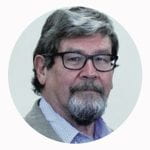 ERWIN TSCHIRNER ERWIN TSCHIRNERUniversity of Leipzig Dr. Tschirner’s main research areas are second language acquisition, corpus linguistics, language testing/assessment, and language policy. He is (co-) author of over 150 books, book chapters, and journal articles, among them Kontakte, the leading German Language textbook for which the authors consulted an inclusivity consultant who commented extensively on the content and helped catch seemingly innocuous items. |
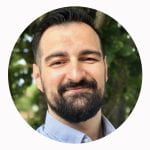 ERVIN MALAKAJ ERVIN MALAKAJUniversity of British Columbia Dr. Malakaj’s research focuses on 19th-century literary cultures, film history, narrative theory, queer theory, critical pedagogy, and humanities as well as language study advocacy. Dr. Malakaj was the expert adviser and inclusivity consultant for the Kontakte authoring team commenting extensively on gender and equity issues. |
All workshop examples will be in English and shared among workshop participants.
The session will be moderated by Franziska Lys, Professor in German and director of the MENA Languages program. Professor Lys is also a member of the Gender Equity Working Group.
For this workshop, you may want to read:
Baburhan Uzum, Bedrettin Yazan, Samar Zahrawi, Siham Bouamer, Ervin Malakaj. (2021) A comparative analysis of cultural representations in collegiate world language textbooks (Arabic, French, and German). Linguistics and Education 61, pages 100901.
https://www.sciencedirect.com/science/article/pii/S0898589820301376
Round Table Discussion
On the basis of the issues covered in the workshop, the round-table discussion will focus on the requirements, challenges, and potential solutions for world languages programs and departments ready to serve and educate a new generation of students within an ever-changing world. Come and join your colleagues and round table experts for a lively discussion. Our Round Table experts will represent publishers, textbook authors, researchers, administrators, instructors, and learners.
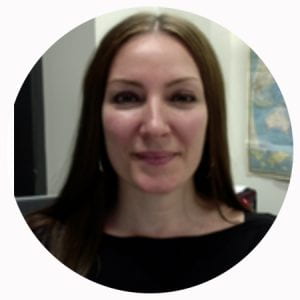 Shannon Millikin is Associate Professor of Instruction in the Department of Spanish and Portuguese. She coordinates and teaches Intermediate Spanish 121 Spanish Phonetics and Phonology, and serves as the Spanish Placement Coordinator. Her special interests include language acquisition, communicative language teaching,and Spanish for the professions. Find out more about Shannon Millikin. Shannon Millikin is Associate Professor of Instruction in the Department of Spanish and Portuguese. She coordinates and teaches Intermediate Spanish 121 Spanish Phonetics and Phonology, and serves as the Spanish Placement Coordinator. Her special interests include language acquisition, communicative language teaching,and Spanish for the professions. Find out more about Shannon Millikin. |
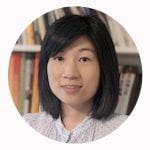 JingJing Ji is Associate Professor of Instruction in he Department of Asian Language and Cultures. She teaches various Chinese language courses at different levels, from novice to advanced, for heritage and non-heritage tracks. She is particularly interested in Chinese heritage language learners’ identity construction. Find out more about JingJing Ji. JingJing Ji is Associate Professor of Instruction in he Department of Asian Language and Cultures. She teaches various Chinese language courses at different levels, from novice to advanced, for heritage and non-heritage tracks. She is particularly interested in Chinese heritage language learners’ identity construction. Find out more about JingJing Ji. |
 Dominique Licops is Professor of Instruction in French. She is currently teaching a range of French language courses and courses on French and Francophone literatures and cultures in the French department. Her interests are, among others, Comparative Approaches to Postcolonial and Gender Studies. Find out more about Dominique Licops. Dominique Licops is Professor of Instruction in French. She is currently teaching a range of French language courses and courses on French and Francophone literatures and cultures in the French department. Her interests are, among others, Comparative Approaches to Postcolonial and Gender Studies. Find out more about Dominique Licops. |
 Ervin Malakaj is Assistant Professor of German and Director of Undergraduate Studies in German at the University of British Columbia. His research focuses on 19th-century literary cultures, film history, narrative the ory, queer theory, critical pedagogy, and humanities as well as language study advocacy. Find out more about Ervin Malakaj. Ervin Malakaj is Assistant Professor of German and Director of Undergraduate Studies in German at the University of British Columbia. His research focuses on 19th-century literary cultures, film history, narrative the ory, queer theory, critical pedagogy, and humanities as well as language study advocacy. Find out more about Ervin Malakaj. |
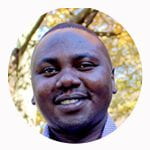 Peter Nderitu Mwangi is Assistant Professor of Instruction in the Program of African Studies where he teaches Swahili. Peter Mwangi’s general research interest is the impact of Less Commonly Taught Languages on the internationalization of higher education in the U.S. Find out more about Peter Nderitu Mwangi. Peter Nderitu Mwangi is Assistant Professor of Instruction in the Program of African Studies where he teaches Swahili. Peter Mwangi’s general research interest is the impact of Less Commonly Taught Languages on the internationalization of higher education in the U.S. Find out more about Peter Nderitu Mwangi. |
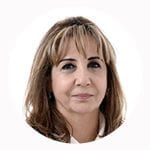 Rana Raddawi is Assistant Professor of Instruction in the Middle East and North African Languages Program at Northwestern University. She teaches first-year, second-year, and third-year Arabic as well as a an Arabic-English translation course. Rana Raddawi is co-lead of the Gender Equity Working Group. Find out more about Rana Radda. Rana Raddawi is Assistant Professor of Instruction in the Middle East and North African Languages Program at Northwestern University. She teaches first-year, second-year, and third-year Arabic as well as a an Arabic-English translation course. Rana Raddawi is co-lead of the Gender Equity Working Group. Find out more about Rana Radda. |
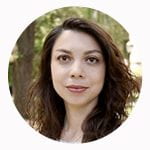 Oya Topçuoğlu is Assistant Professor of Instruction in the Middle East and North African Languages Program at Northwestern University. Dr. Topçuoğlu teaches on a range of subjects, including modern Turkish language and culture, and the history and archaeology of the Middle East. Her first-year seminar explores Turkish identity, politics, and history through the lens of food from the Middle Ages to today. Find out more about Oya Topçuoğlu. Oya Topçuoğlu is Assistant Professor of Instruction in the Middle East and North African Languages Program at Northwestern University. Dr. Topçuoğlu teaches on a range of subjects, including modern Turkish language and culture, and the history and archaeology of the Middle East. Her first-year seminar explores Turkish identity, politics, and history through the lens of food from the Middle Ages to today. Find out more about Oya Topçuoğlu. |
 Erwin Tschirner is Gerhard Helbig Professor of German as a Foreign Language and Applied Linguistics at the University of Leipzig and President of the Institute for Test Research and Test Development in Leipzig, Germany. His main research areas are: second language acquisition, corpus linguistics, language testing and assessment, and language policy. Find out more about Erwin Tschirner. Erwin Tschirner is Gerhard Helbig Professor of German as a Foreign Language and Applied Linguistics at the University of Leipzig and President of the Institute for Test Research and Test Development in Leipzig, Germany. His main research areas are: second language acquisition, corpus linguistics, language testing and assessment, and language policy. Find out more about Erwin Tschirner. |
 Marcelo Worsley is an Assistant Professor in Computer Science and Learning Sciences. He directs the technological innovations for inclusive learning and teaching (tiilt) lab, which aims to develop pedagogical and technological solutions for supporting learning among diverse populations. Marcelo Worsley is co-lead of the Gender Equity Working Group and will be moderating the round table discussion. Find out more about Marcelo Worsley. Marcelo Worsley is an Assistant Professor in Computer Science and Learning Sciences. He directs the technological innovations for inclusive learning and teaching (tiilt) lab, which aims to develop pedagogical and technological solutions for supporting learning among diverse populations. Marcelo Worsley is co-lead of the Gender Equity Working Group and will be moderating the round table discussion. Find out more about Marcelo Worsley. |